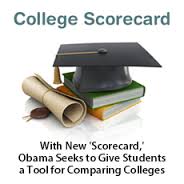
Study: Higher ed accountability should be based on multiple metrics, not one
The Case Against Oversimplified Accountability
Focus on any single labor market metric to judge colleges’ outcomes will create flawed policy, but a mix of such measures can help evaluate institutions’ performance, scholarly study finds.
Policy makers of all political stripes have been pushing to hold colleges and universities accountable by looking at the outcomes of their former students in the labor force — whether they are employed full time, how much they earn, etc.
Last year, the Obama administration included median postcollege earnings for over 4,000 colleges and universities in its College Scorecard data. Plus, as of 2015, 32 states had some form of performance or “outcome-based” funding for public institutions of higher education. In fact, one institution — the Texas State Technical College System — makes funding recommendations to the state Legislature solely by analyzing data on students’ postcollege earnings.
Such approaches often draw criticism for embracing an overly vocational view of what higher education is for, for focusing too narrowly on a small set of indicators or for thinking too short term.
A new study examining the use of labor market outcomes concludes that use of a single metric cannot accurately evaluate institutional performance, but that a mix of several different measures sorts institutions better than using no labor market indicator at all.
The study from the National Bureau of Economic Research (abstract available here) analyzed data from the Ohio Education Research Center — specifically, student data from 2000 to 2007 and labor market data from 2000 to 2012. The sample included data on students from 30 four-year colleges and 28 two-year colleges. It constructed four labor market accountability metrics and one metric to measure academic success.
The four labor market metrics were: (1) full-time, full-year employment; (2) annual earnings conditional on full-time, full-year employment; (3) employment in the social service sector to “address the critique that earnings are not the only positive outcome of education,” the study stated; (4) and the proportion of students who had ever claimed unemployment since college.
“There are other outcomes besides earnings that can be measured by looking at social services,” said Judith Scott-Clayton, associate professor of economics and education at Teachers College at Columbia University, who co-wrote the study with Veronica Minaya, visiting scholar at Teachers College.
“In the public sector, there may be lower wages, but there are often better pension benefits and health care benefits, and tenure protection for teachers,” Scott-Clayton said.
Degree completion rates were also calculated for two- and four-year colleges to compare outcomes in the labor markets to academic outcomes. Many states use academic measures as part of their performance-based formulas for funding, but the study found that academic outcomes alone are not necessarily a good indicator of postcollege student success.
Among the study’s conclusions: examining earnings after a long period of time is more reliable than examining earnings one year after graduation. Graduates may not be making salaries that are representative of their future earnings after one year, especially if they are continuing their education. So the simplest labor market metrics (employment rates and earnings one year after graduation) are problematic.
Even if institutions wait 10 years to collect data on student earnings, state unemployment insurance databases can provide more robust measures of postcollege experiences than earnings alone. Earnings don’t take into account well-being or access to health insurance, for instance, and unemployment insurance databases can also tell institutions whether graduates are employed year-round and how many have filed for unemployment.
In addition, researchers found differences between metrics for two- and four-year institutions. Degree completion rates aren’t a good indicator of graduates’ outcomes in the labor force, especially when it comes to two-year colleges. However, the conditional earnings metric — that is, annual earnings conditional on full-time, full-year employment — is much more stable for two-year colleges than four-year colleges. This could be because students from two-year colleges tend to go straight into professional careers, while students from four-year colleges tend to settle into the labor force more slowly, said Scott-Clayton.
The study has its limitations, noting that it did not control for outside factors such as student ability or family income, and the researchers did not analyze input-based measures of institutional quality and selectivity.
Still, the ultimate conclusion of the study is clear. Measuring the performance of institutions of higher education with a single metric is hugely problematic — any metric alone fails to measure variability in labor market outcomes and other aspects of well-being. Instead, it’s best to consider several metrics when determining whether college graduates are getting an appropriate bang for their tuition buck.
In the end, “the choice of what to measure is much more important than exactly how to measure it,” Scott-Clayton said.

